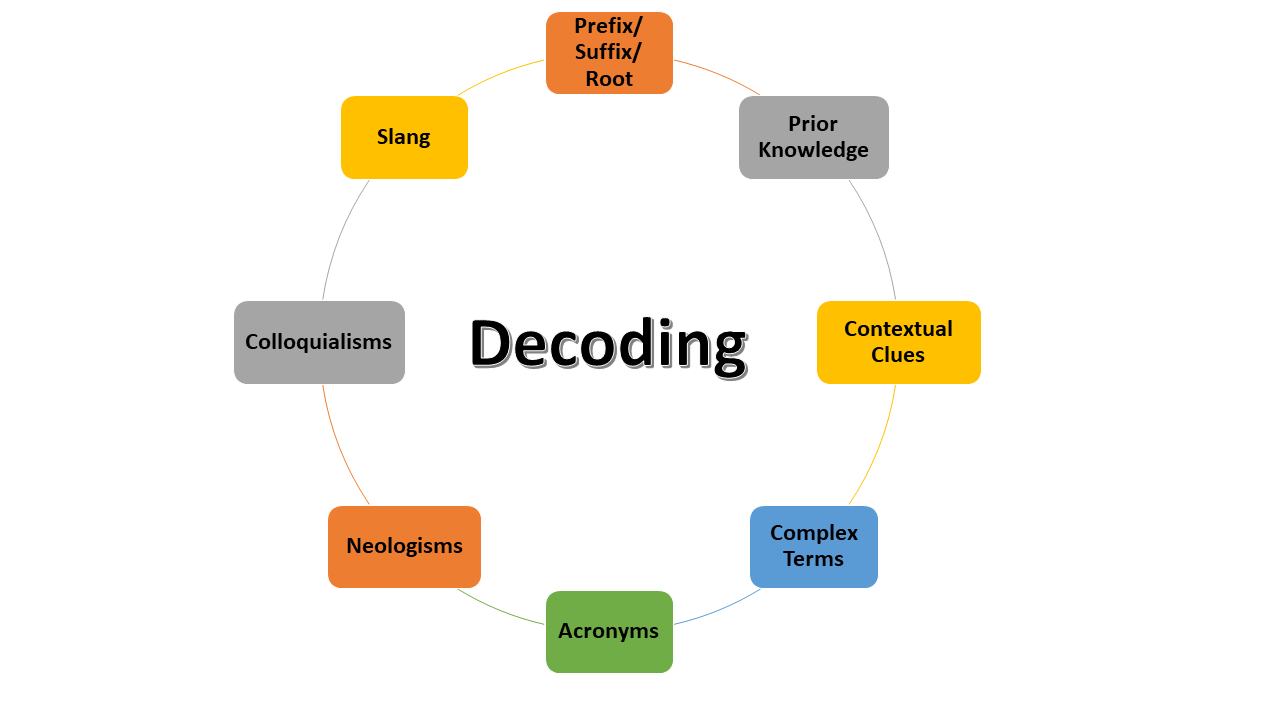Have you ever started reading a book or an article and found that half the words have no meaning to you. You have difficulty in understanding them, let alone pronouncing them?
So, maybe the first question that we must ask ourselves is why do we need to understand and use the information that we are reading in the workplace?

So, let’s look at the types of documents that you might come across in your workplace include e-mails, reports, memoranda, letters, agendas, minutes of meetings, accounts, diaries, magazine articles or work-related newsletters, annual financial reports.
There will be times that you will come across words that are confusing or unfamiliar when you are reading. Apart from looking that word up in the Dictionary, there are other ways of finding the meaning of these words.
You could try breaking the word down into understandable words; this is known as a “decoding skill”. Decoding is when your brain changes difficult words into easy, understandable words. Decoding skills are also known as ‘word-attack’ sills. It is called ‘word-attack’ because you either ignore the word or guess its meaning.
You can decode the meaning of an unfamiliar word by:
- Looking at the word structure.
- Using your prior knowledge.
- Looking for clues in the context where the word is used.
Let’s look at these in more detail...
Word Structure
Sometimes the meaning of a word can be understood by breaking the word down into two or three parts:
Prefix
This is a letter, syllable or word that is placed at the beginning of a word to change its meaning. As an example, let’s take the word DISCOMFORT. You will recognise the word COMFORT, so the DIS is the prefix. This way you have split the word into two parts. Now, look up DIS in the Dictionary. The Dictionary gives you several meanings – the meaning of DIS changes according to the word used. So, Comfort means your body is at ease – the DIS in Discomfort changes the meaning to “your body is not at ease”.
Try doing the same with the following words:
|
Misunderstand |
|
|
Disable |
|
|
Disagree |
|
|
Rearrange |
|
Suffix
This is a letter, syllable or word placed at the end of a word that can also change the way the word is used in a sentence. For instance: arrangement, comfortable, understanding. Can you identify the suffix for each of these? Let’s try the first one: ARRANGEMENT: We can identify the word ARRANGE – so the suffix is MENT. “Arrange” is a doing word – you ‘arrange’ the tables and chairs in a room. The MENT then makes the word a noun – the arrangement of the tables and chairs suited the purpose of the event.
Root
In each of the above, we identified the root word. This was the original word that we recognised; for instance ARRANGEment and disCOMFORT.

Prior Knowledge
The other way of identifying the meaning of a word is by asking yourself questions, such as:
- Do I know this word?
- Can I pronounce it?
- What do I think about when I see this word?
- Where have I heard this word before?
Have a look at the following words and see if you can identify their meanings:
Trek: move or journey – taken from Afrikaans
Yebo: Yes – taken from Zulu meaning Yes.
Koppie: Hill – taken from Afrikaans.
Breyani: A meat and rice dish – taken from Urdu.
Samoosa: Savoury/spiced mince in pastry that is shaped in a triangle – taken from Indian.
These are all familiar words to you probably as you would use them normal conversation with friends and family, but they are not originally English, they are borrowed from other languages used in South Africa. Others that you would recognise that are typically South African are: Springbok, Wildebeest, Boerewors and Veld.

Contextual Clues
When you are reading a report or even a book, you may find a word that is not familiar to you and you do not know what it means. You may be able to identify its meaning by reading other words and sentences that surround the unknown word that give you clues to its meaning. These clues are known as contextual clues.
Complex Terms
Just like complex facts, complex terms are part of language. Complex terms refer to words that appear difficult and unknown to the reader. These words may or may not be difficult to pronounce. Complex terms can be related to a particular subject or field of study. Experts often use complex terms to communicate, making their message seem even more complicated.
Acronyms
These words are formed from the first letter of each word in a title or phrase; such as AIDS – Acquired Immunity Deficiency Syndrome or SPCA – Society for the Prevention of Cruelty to Animals.
Try a couple of these:
ESCOM – Electricity Supply Commission
COSATU – Congress of South African Trade Unions
SABC – South African Broadcasting Corporation
asap – as soon as possible
NUMSA – National Union of Mineworkers of South Africa
Neologisms
Neologisms are newly invented words or existing words with new definitions. Especially in the computer industry, e.g. e-mail, etc.
Occasionally, new terms have to be coined for new situations, inventions, items, etc.
A good example is cell phone: The equivalents in other languages are: selfoon, iselula; selula founo; selula founu.
Another example is: Unleaded petrol - its equivalent being ongelode petrol.
To help you identify neologisms, ask yourself the following questions:
Is it a noun, verb or adjective? (use your skills to identify word structure)
- A noun is a word used to name a person, animal, place, or object.
- A verb is a ‘doing’ or action word.
- An adjective describes a noun.
Does it have a prefix? We have already learned that a prefix is a syllable or word put at the beginning of the word to modify the meaning, e.g. rearrange, discomfort, misunderstanding.
Does this prefix have a meaning?
Can you identify other word(s) from which the neologism is derived? For example, if we look at the neologism microwave we identify the words micro and wave. Similarly, the following neologisms allow us to identify the words that they are derived from.
- couch-potato (from couch and potato).
- hi-fi (from high and fidelity).
- permit (from permission).
Colloquialisms
Colloquialisms are words that relate to, or are used in common or familiar conversations. This is the type of language you would use with your friends and not in an office or with your employer. Some are also specific to the country in which one lives. The Oxford English Dictionary says the following: Words or phrases used in normal conversation but not formal speech or writing.
Here are some examples of colloquialisms found in South Africa:
- We had a lekker jol last night. (good/excellent party, good time).
- Howzit going? (hello, how are you).
- I am really gatvol. (I have really had enough).
- Ag no man. (expressing discontent).
- Aita bra. (greetings to you my brother).
Slang
Slang is related to colloquialisms and refers to informal words or phrases that are used by specific groups of people. It is usually related to teenagers, although it can also be used by older or younger speakers. Slang is not long-lasting and ranges, in most cases, from months to a few years. You would not use slang at work when speaking to your employer or some of your work colleagues.
Examples of slang found in South Africa:
- Cool
- Chick
- Cherry
